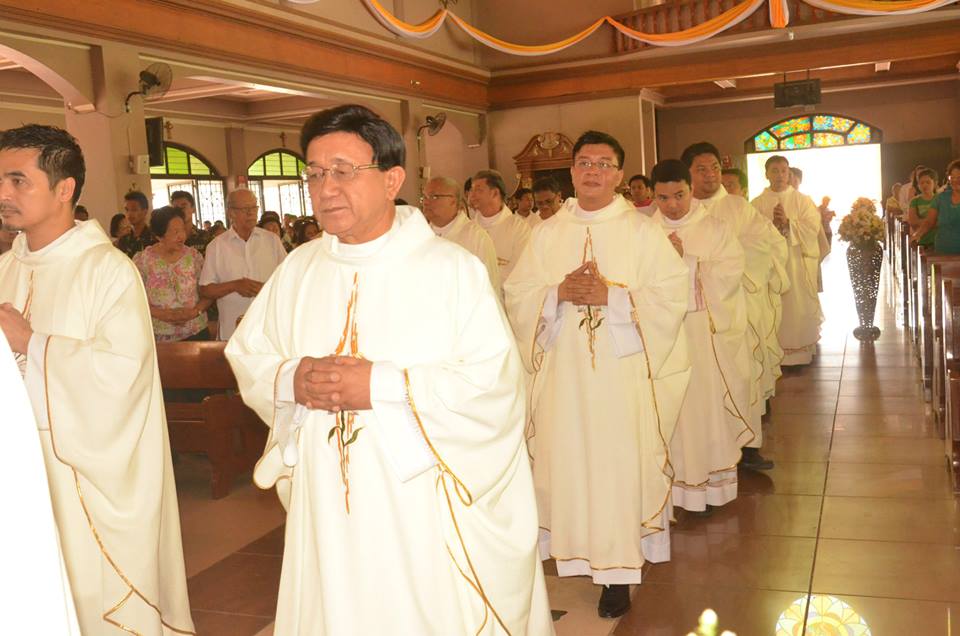The killing of retired priest Marcelito Paez has sent a chilling message to priests who work with the poor.
“Maybe I’m next,” says Bishop Roberto Mallari of the Diocese of San Jose, Nueva Ecija province. “If you want to be a priest, you have to be ready to die.”
Paez was ambushed by unknown assailants along Barangay Lambakin in Jaen, Nueva Ecija, on the same day he helped facilitate the release of political prisoner Rommel Tucay in Cabanatuan City.
Fr. Tito to those who knew him well, Paez served the diocese for 34 years and headed the Office of Justice and Peace. He was a member of the social action commission and worked as coordinator of the Rural Missionaries of the Philippines after his retirement in 2015.
Mallari believes Fr. Tito’s concern for the poor sealed his fate.
“The church has always been like that. We risk being identified with certain groups, especially if we’re helping a person connected to a group in particular,” he said.
Prior to Paez’s death, a child, a lay minister and a pastor had been killed in different parts of the country, the bishop noted.
Religious groups claimed the killings were consequences of President Rodrigo Duterte’s proclamation tagging the Communist Party of the Philippines (CPP) and its armed wing, the New People’s Army, as terror groups.
The Philippine Ecumenical Peace Platform, the largest formation of church leaders in the country, called on the President to revoke the terror tag proclamation, and asked the government and the National Democratic Front, the political arm of the CPP, “to talk peace instead of waging war.”
The Catholic Bishops Conference of the Philippines (CBCP) Episcopal Commission on the Laity has condemned the increasing “senseless killings” under the Duterte administration.
“Fr. Tito, living in a society where poverty, exploitation, demolitions and killings have become the norm, was compelled by his Christian faith to stand by the victims and those struggling for justice. He has now become one of the victims of this increasingly tyrannical society where human life is expendable,” the group said in a statement.
In a statement, human rights group Amnesty International said, “Under President Duterte, activists and human rights defenders in the Philippines have come under increasing attack,” citing the killing of Paez, among others.
Another rights group, Karapatan, blamed the Duterte administration in a strongly-worded statement for a “fascist and terrorist regime that has turned the entire country into a killing field, which renders nobody safe.”
It added, “This is the chilling effect of the Duterte regime’s fascist policies and pronouncements, one on top of the other.”
Paez’s death has sparked outrage, prompting lawmakers to seek a probe on the killing.
In a press briefing, Presidential Spokesperson Harry Roque said an investigation has yet to be conducted on whether the priest’s death is a political killing.
“The news items, I don’t know if you read them, they would connect it to Duterte since he ordered, ‘kill them all, he ordered to kill them all,’” Mallari said.
But the bishop would rather not debate whether Fr. Tito’s death is politically motivated or not.
All he knows is that the country is in a worrisome state, and the Church will continue to extend help to anyone regardless of political beliefs.
“We consider the needs of the person, whether he’s embracing this ideology or not, there’s a need really to help,” said Mallari.
The bishop said working for the poor is often identified with being leftist. “Usually, they would say you work for them,” he added.
For 34 years, Paez had always been involved with social concerns and worked closely with the poor, the farmers and those who experience “different kinds of injustices,” Mallari said of his colleague.
According to the CBCP, Paez was among the leaders of the Central Luzon Alliance for a Sovereign Philippines, which campaigned in the 1980s against the U.S. military bases in Central Luzon.
He often led church service for victims of human rights violations and communities in Nueva Ecija and Central Luzon.
“Even after he retired, his concern for the poor was always still there,” Mallari said.
Amid the loss of a colleague and the perceived threat on his life, Mallari takes comfort in what he believes is a silver lining.
While the gunmen were firing at the driver’s seat, Mallari recalled, Paez rolled down his van’s window and said, “I’m a priest, I’m a priest.”
“When they heard that he was a priest, they stopped shooting. They stopped and left,” he said.
Gunmen would usually go for the kill even if their prey begged for mercy. It was not the case during Paez’s ambush.
“At that time, it meant that the killers, perhaps, still had respect for the priest,” Mallari said.
Fr. Tito died while he was being prepared for treatment at a hospital.
(with Luz Rimban)
